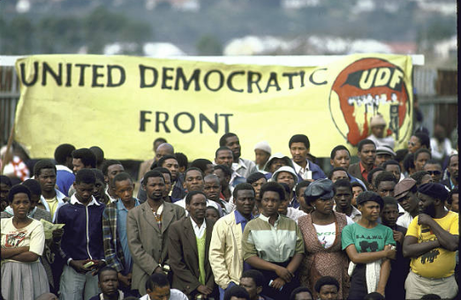Longman Co-Authors E-Textbook Confronting Apartheid
Timothy Longman, Associate Professor of International Relations and Political Science and Director of the Institute on Culture, Religion and World Affairs (CURA) at the Frederick S. Pardee School of Global Studies at Boston University, co-authored a recently published e-textbook entitled Confronting Apartheid.
The book, which Longman co-wrote with Barbara Brown –former Director of the Africa Outreach Program at the African Studies Center at the Pardee School– and Adam Strom, explores critical moments in South Africa’s history, including the period prior to European colonization, the period of colonization, the development of policies based on racial segregation, and the development of the apartheid state.
Confronting Apartheid was published with Facing History and Ourselves, a nonprofit international educational and professional development organization that engages students of diverse backgrounds in an examination of racism, prejudice, and antisemitism in order to promote the development of a more humane and informed citizenry.
Longman said Confronting Apartheid provides students with resources to help tackle the complex issues of identity, race and power that surround apartheid.
“It has been a great pleasure to partner with Facing History and Ourselves, an organization that has a long history of developing materials to help teachers discuss difficult subjects like the Holocaust and the history of racism in the US,” Longman said. “The text that we have developed includes brief overviews of South African history and lots of primary documents to help students grapple with the difficult issues of identity, race, and power. The textbook is designed above all for high school teachers, but many of the resources will be useful in the college classroom as well. I used one of the resources last spring in my human rights class and was really pleased with how much it encouraged students to engage.”
Confronting Apartheid also discusses anti-apartheid movements and the institutions, policies, and principles put in place to facilitate the development of a non-racial democracy. It also includes both the growth of race rule and resistance to white rule.
The book covers themes of identity, membership, and belonging as explored through the stories of individuals, communities, organizations, and institutions; explorations of the human behavior throughout this turbulent history, including examples of conformity, obedience, and perpetration as well as resistance and the human consequences of violent victimization; examples of civic engagement at the national and communal leadership levels; and examinations of a nation’s work to redress and repair its violent past and its legacies in order to establish and nurture a democracy.
Longman’s current research focuses on state -society relations in Africa, looking particularly at human rights, transitional justice, democratization, civil society, the politics of race and ethnicity, religion and politics, and women and politics.
